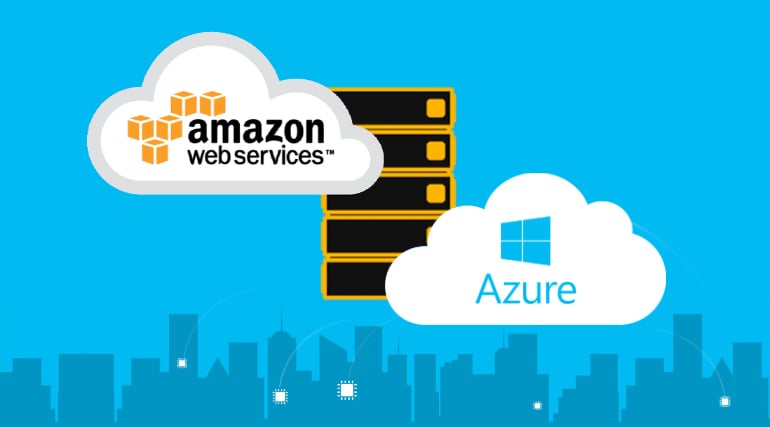Cloud technology is pivotal to enterprise mobility and digitalization efforts due to its ability to offer innovations in driving operations at a much faster rate. In this digital transformation era, cloud has become more analogous to the internet. Enterprises are even adopting multiple-clouds to keep up with the business needs. This makes it challenging to manage resources in a growing IT infrastructure and on-demand services in a cloud environment.
To serve this challenge, many cloud service providers have evolved. Amazon's AWS is the first to launch full stack cloud solutions and become a large player in the cloud area. However, Microsoft's Azure has become a tough player in the cloud arena. So, here we present the differences between AWS and Azure.
What Businesses Expect from a Cloud Service Provider
- Intelligent resource optimization and management
- Enhanced architecture flexibility
- Smart and improved computational speeds
- No latency
- Easy management
- Server consolidation
- Rapid provisioning
- Storage management
- Data control
- Tightly integrated purpose-built application infrastructure
- Component-based infrastructure
- Application provisioning with server virtualization
-
Easy integration with other cloud providers
Amazon's AWS vs. Microsoft's Azure Cloud Services
1. Availability Zones
- Amazon: 66 Availability Zones within 21 geographic Regions around the world, with announced plans for 12 more Availability. Clients across 190 counties
- Azure: 54 regions worldwide and Spread across 140 countries/regions
2. Revenue
- Amazon: As of Q1, 2019, revenue is estimated to be $59.7 billion
- Azure: As of Q1, 2019 revenue is estimates to be $9.6 billion
3. Pricing Model
- Amazon: Hourly basis. This model works well for larger enterprises than SMB’s. AWS has revised its models to be SMB friendly
- Azure: As of Minute basis. Not as flexible as the AWS pricing model.
4. Overall Market Share
- Amazon: 40 percent
- Azure: 30 percent
5. Adoption of Container service (ECS/EKS)
- Amazon: 44 percent adoption in 2019
- Azure: 28 percent adoption in 2019
6. Opensource Community
- Amazon: More support for opensource tools (like Jenkins, Docker, GitHub and so on) for integrations within the AWS platform.
- Azure: Provisions native integration tools and aids integrations to RedHat and Hadoop with Azure. But, lacks full-size open source community support, in terms of documentation, technical support, training resources, and so on.
7. Storage
- Amazon:
- Instance is terminated when storage is removed.
- Provides Block storage that can be either attached to any instance or kept separate.
- Archiving services with Glacier and object storage with S3 services.
- Azure:
- Page Blobs and temporary storage for VM based columns.
- Files and Block Blobs server for Object Storage.
8. Cloud Support
- Amazon: Uses an on-demand cloud computing model. Has room to improve in the hybrid cloud space.
- Azure: Full hybrid cloud platform support and easily integrates onsite servers with cloud instances.
9. Database Support
- Amazon: AWS completely supports NoSQL, DynamoDB, Oracle, and relational databases as well as Big Data.
- Azure: Azure supports NoSQL databases, relational databases, and big data through HDInsight and Windows Azure Table.
10. Security and Compliance
- Amazon: Security standards of AWS and Azure are similar, only differentiator is AWS has Customer-managed keys.
- Azure: Azure has more than 90 compliance features, which is higher than any other cloud providers.
11. Application Deployment Feasibility
- Amazon: Offers solutions like Elastic Beanstalk, Lambda and so for cloud application deployments.
- Azure: Azure offers a strong set of developer tools like Azure Service Fabric, Container Service and so on to easily build, package, deploy and manage cloud apps, microservices and containers.
12. IaaS, SaaS, and PaaS cloud Model
- Amazon: With services like EC2 and S3, AWS is very strong as an IaaS. AWS provides a vast set of options for businesses of all scales to use features like ML, AI, Lambda at low cost.
- Azure: Azure IaaS and PaaS services are almost the same as AWS but Azure has the upperhand from AWS in the case of SaaS due to to application development platforms like .Net, Office, and other frameworks.
















